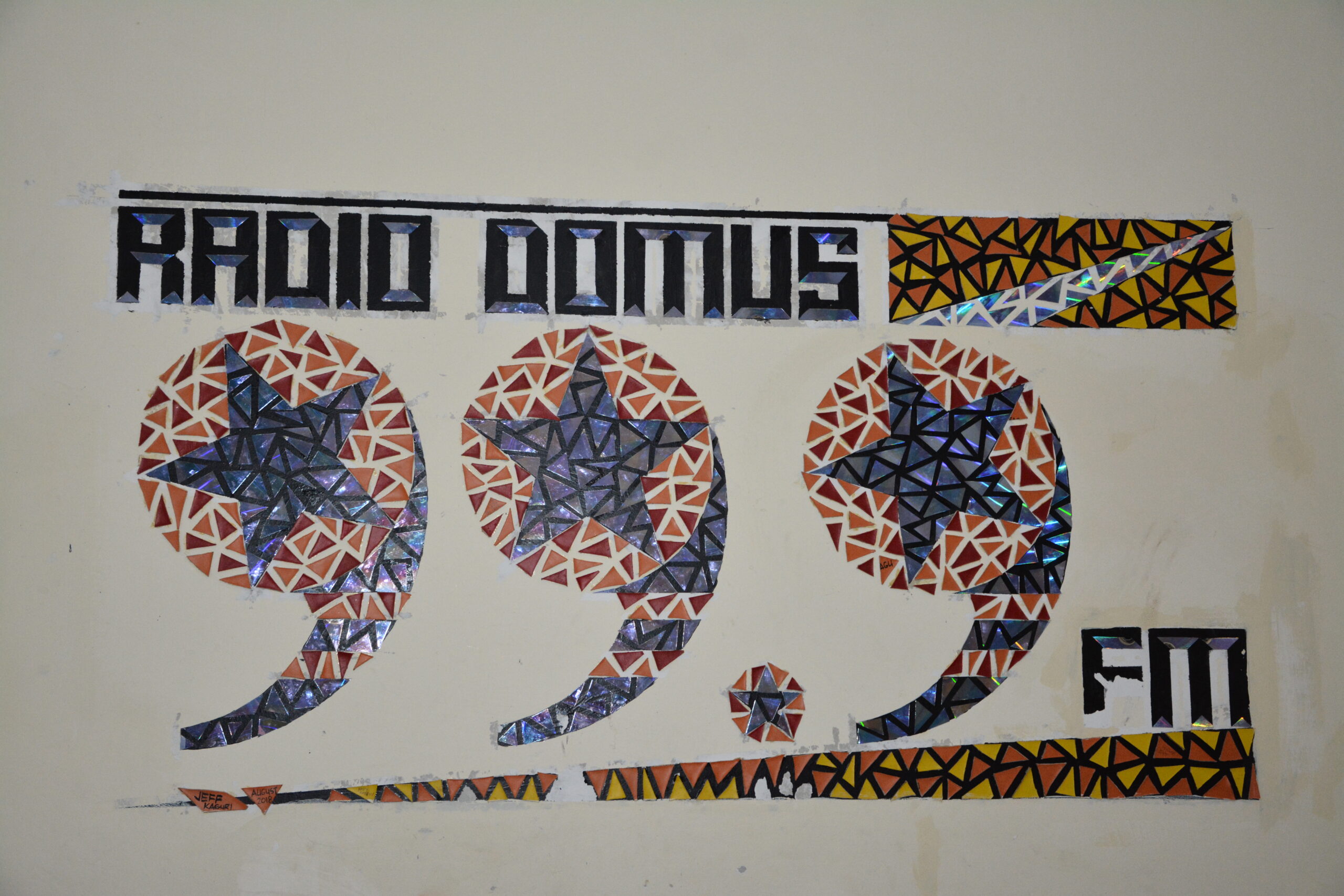This article was originally published by the UNESCO Regional Office for Eastern Africa.

When Bonface Opany graduated from college in 2015, he heard about a volunteer call from a new community radio station in his neighbourhood.
“I became part of the first cohort that helped the station to go on air on its very first day,” he recalls. “It turned out that our transmitter was faulty, and the hosts had been talking to themselves for two hours before we realised we were off-air!”
Nearly a decade later, Bonface now serves as the Station Manager of Radio Domus FM, the same community radio where he had started. Covering an area of 25 square kilometers, the community radio station has come a long way from its early beginnings and now serves 350,000 daily listeners in parts of Kajiado North, Kajiado West and Langata sub-countries in Kenya.

Kajiado North is home to a large itinerant labour force who commute daily to Nairobi for work, thus earning the region its moniker as the “bedroom of Nairobi”. Once largely inhabited by the Masai tribe, it is today a highly cosmopolitan area, drawing diverse peoples who moved and settled in the outskirts of the capital city amidst its rapid growth over the past few decades.
This melting pot comes with challenges. Matters of land ownership between old inhabitants and new settlers, discontent over the proportion of ethnic representation in the county government, low levels of income and education, as well as politically-driven online hate speech among youth, are some examples of social and political tensions faced by the community.
Against this backdrop, Radio Domus serves as a key communicator and mediator in the community. Over the last decade, Bonface and his team have practiced an “Open Door Policy” to build trust between the radio and the community. In addition to free SMS lines which the public can use to give feedback on the radio’s regular programming, the radio also hosts year-end forums for listeners to raise their concerns and provide suggestions for new programmes at the Domus studio in Karen Village, a cosy arts and culture space just outside Nairobi.
Today, community members feel free to express and exchange perspectives in the thriving public space which the radio has helped to create.
The Voice of the Community: Radio’s Role in Ground-up Democracy
“We live among the communities we serve,” explains Bonface, when we ask him how Radio Domus serves an audience as diverse as Kajiado. “That gives us an advantage of first-hand feedback and information, which helps us to co-create programmes that take into account as many different views as possible.”
One example is Radio Domus’ multi-religious programming. In addition to the regular morning Gospel slots for the Christian community, Muslim leaders and community members are also given a platform. This ensures that different groups feel included and heard. Sometimes, Christian and Muslim community leaders are also brought on-air together to foster inter-religious dialogue.
Recently, the radio has also piloted “Social Monitoring and Accountability Teams”, small roving listener groups formed by community members who are responsible for gathering and disseminating information to the grassroots. The lean eight-person Domus team also relies on the networks and influence of key individuals among their community, such as women, youth and religious leaders, to engage and represent the views of their peers.
Bonface shares that the community radio has also helped to improve public participation and government accountability. As part of its regular programming, it runs a Wednesday morning show on governance to educate the community on salient policies and political events. During elections, community radios like Radio Domus serve as an important democratic platform for aspirants to debate in a respectful and transparent manner.
“It is also two-way communication between the speakers and the listeners,” Bonface emphasises. “We open the phone lines during such debates so that community members can participate and raise questions too.”
During one such debate, community members called in to express dissatisfaction about opportunities for public participation. In particular, constituents felt that county leaders were not involving them enough in key decisions.
“Since the last election, we’ve actually seen evidence that our local leaders responded to public opinion raised in these civic spaces. The county government is reaching out to us more to advertise public participation events.”
These positive trends have also encouraged more people to participate in civic spaces and processes of governance.
“It is really heartening,” adds Bonface, “It didn’t use to be like this before.”
#SocialMedia4Peace: Protecting Democracy and Free Speech Online
As part of joint efforts by Kenya’s community radios under the Association for Community Media Operators in Kenya (ACKMO), Bonface served as a project coordinator for the recently concluded #AmaniOnline campaign. #AmaniOnline was a month-long radio campaign under the EU-funded UNESCO Social Media 4 Peace programme, which seeks to protect freedom of expression while strengthening the resilience of civil society to the spread of harmful content online.
Alongside fellow community radio stations like Mtaani Radio and Ruben FM, Radio Domus practiced what it does best as part of the #AmaniOnline campaign—creating common ground. It moderated discussions between Commissioners from the National Commission for Integration and Cohesion (NCIC) and the National Council for Persons with Disabilities (NCPWD) on issues relating to online harmful content and the need for community cohesion.
The interviews were broadcast in Swahili and Masai languages to appeal to Domus’s regular listeners in their local tongue.
Radio: A Century of Informing, Entertaining and Educating
On the occasion of World Radio Day 2024, which commemorates the 100th anniversary of radio, we pay tribute to this timeless medium that continues to stay closest to human hearts and minds. Whether in times of normalcy or crisis, radio has remained a key vehicle for freedom of opinion and access to information. Even amidst a fast-digitalizing information ecosystem, it continues to preserve and grow its role as a bridge between online and on-ground communities and conversations.
The triumph of trust and accessibility embodied by Radio Domus and other community radios in Kenya points to the need to continue safeguarding and promoting radio as a foundation of inclusive knowledge societies. Community radios in particular live and breathe among the communities they serve, help minority language speakers to receive information and participate in democratic processes, and ensure that the means of civic participation remains available to all individuals regardless of identity, financial means or personal circumstances.
“Everybody should have the opportunity to be heard.” — Bonface Opany, Station Manager, Radio Domus
